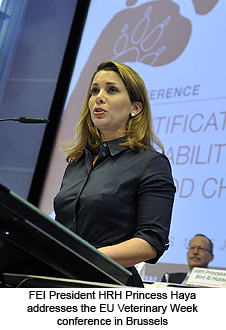
Speaking to top European Veterinary officials attending the third European Veterinary Week (EVW) in Brussels today, the FEI President highlighted the need to create a clear distinction between the sport horse as an equine athlete and livestock that is part of the food chain.
Identification and traceability are hugely important to the equine industry, she noted, helping to minimise the risk of disease-spread during the cross-border transportation of competition horses and also enhancing integrity and promoting public confidence in the equestrian industry.
As an industry with an estimated annual turnover of around 30 billion Euro and, depending on the member state, the creation of one job per 4-10 animals, a disease outbreak would have a huge economic impact on horse sport.
The horse is uniquely one of the most internationally moved animals on the planet, Princess Haya stated, emphasising that the FEI is very aware that the transportation of horses must take place safely, but with appropriate regard to risk. “Therefore we support the EU health requirements and recording of movements, both within the EU, and into the EU from third countries”, the FEI President said.
She pointed out that the international equine athletes that compete under FEI rules are probably the most inspected and checked animals in the world, with over 1,000 FEI Veterinary Officials working at events worldwide to ensure that FEI rules on vaccination requirements, freedom from disease and fitness to compete are adhered to.
The FEI President stressed that the equestrian industry recognised the need for identification documents some time ago and that the FEI was one of the first organisations to provide horse passports on a global scale. The FEI also contributed to the establishment of an identification system of Unique Equine Life Numbers – UELNs – for horses.
“As an industry and as an organisation, we completely support the EU requirement for the now compulsory passports of all equines within the community and the introduction of mandatory microchipping”, Princess Haya said.
The European Veterinary Week (EVW) was organised for the first time in 2008 by the European Commission and the Federation of Veterinarians of Europe. It aims to increase the public’s interest and awareness in EU animal-health and food-safety matters. In light of the positive feedback received from Member States, veterinarians, stakeholders and the general public, it was felt that it would be beneficial to have an EU Veterinary Week annually.
The theme for this year’s EVW, which takes place in Brussels from 14-20 June, is animal identification and traceability. The week opened with a two-day conference for over 400 delegates, including the Chief Veterinary Officers from EU Member States, as well as representatives of third countries, international organisations, EU veterinary faculties, stakeholder organisations and media.
More from Canadian Thoroughbred:





